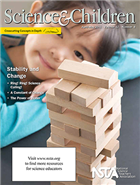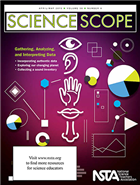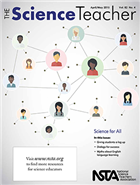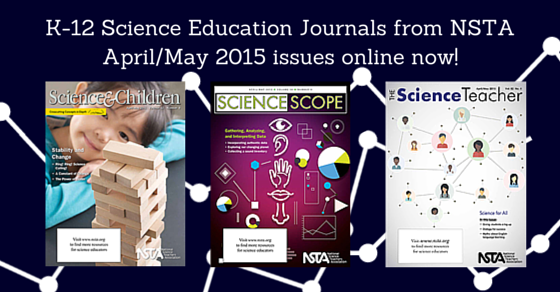NSTA's K-12 April/May Science Education Journals Online
By Lauren Jonas, NSTA Assistant Executive Director
Posted on 2015-05-11
Stability and change; gathering, analyzing, and interpreting data; and science for all—these are the themes of the April/May 2015 journal articles from the National Science Teachers Association (NSTA). Browse through the thought-provoking selections below and learn more about the power of water, what happens when an environment changes, using authentic data, myths about English Language Learners, and other important topics in K–12 science education.
Science and Children
 While stability and change are phenomena that we deal with frequently within many science concepts, they are rarely pointed out or emphasized. This issue of Science and Children offers ideas for helping students identify when they recognize these elements within the investigations and when it is appropriate to use these terms.
While stability and change are phenomena that we deal with frequently within many science concepts, they are rarely pointed out or emphasized. This issue of Science and Children offers ideas for helping students identify when they recognize these elements within the investigations and when it is appropriate to use these terms.
Featured articles (please note, only those marked “free” are available to nonmembers without a fee):
- A Constant of Change
- Free – Editor’s Note: Stability and Change
- Free – Ring! Ring! Science Calling!
- Science 101: How Does Stable Equilibrium Differ From Other Kinds of Equilibrium?
- The Power of Water
- What Happens When An Environment Changes?
- Full Table of Contents
Science Scope
 Gathering, analyzing, and interpreting data are at the heart of doing science. In this issue we offer a variety of activities you can use with your students to engage them with real-world data as they explore different science topics. We hope they will help your students make better sense of the world around them.
Gathering, analyzing, and interpreting data are at the heart of doing science. In this issue we offer a variety of activities you can use with your students to engage them with real-world data as they explore different science topics. We hope they will help your students make better sense of the world around them.
Featured articles (please note, only those marked “free” are available to nonmembers without a fee):
- “Nor Any Drop to Drink” Students Engineer Solutions for Desalinating Ocean Water
- Free – Editor’s Roundtable: 3-4-8: A Winning Combination for Science Instruction
- Free – Exploring Sound! Using Tablets in Middle School Science
- Let Them Eat Cake …OE-Cake!
- Teaching With Tarantulas
- Using Authentic Data to Enhance Middle School Atmospheric Science Instruction
- Using the Scientific Process to Engage Students With Our Changing Planet
- Full Table of Contents
The Science Teacher
 This issue of The Science Teacher marks our 20th consecutive annual issue devoted to the theme of “Science for All.” Teaching strategies targeted toward a specific group almost always turn out to improve learning for all groups. And so, when this issue suggests ways to use quality graphics to support English language learners or provides ideas for using videos to engage reluctant readers, you will also discover ideas that work for all students who struggle to read science texts. Likewise, in an article describing strategies to support students with weak executive functioning skills, you will find ways to improve all your students’ organization, planning, and self-regulation abilities. High-quality teaching strategies like those in this issue benefit students well beyond the targeted groups.
This issue of The Science Teacher marks our 20th consecutive annual issue devoted to the theme of “Science for All.” Teaching strategies targeted toward a specific group almost always turn out to improve learning for all groups. And so, when this issue suggests ways to use quality graphics to support English language learners or provides ideas for using videos to engage reluctant readers, you will also discover ideas that work for all students who struggle to read science texts. Likewise, in an article describing strategies to support students with weak executive functioning skills, you will find ways to improve all your students’ organization, planning, and self-regulation abilities. High-quality teaching strategies like those in this issue benefit students well beyond the targeted groups.
YouTube fans, watch high school science teacher and TST Field Editor, Steve Metz, introduce this month’s issue.
Featured articles (please note, only those marked “free” are available to nonmembers without a fee):
- Dialogs for Success
- Free – Editor’s Corner: Science for All Turns 20!
- Giving Students a Leg Up
- Free – Making Molecular Movies
- Myths About English Language Learning
- Picture Perfect
- Full Table of Contents
Get these journals in your mailbox as well as your inbox—become an NSTA member!
Follow NSTA
Disclaimer: The views expressed in this blog post are those of the author(s) and do not necessarily reflect the official position of the National Science Teaching Association (NSTA).



